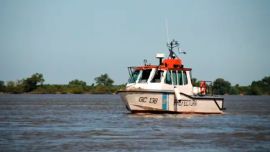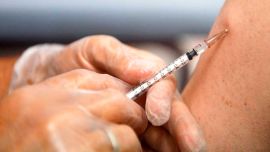The government of New Zealand announced a ban on "military-style" semi-automatic firearms and high-capacity magazines Thursday, just a week after such weapons were used in attacks on two mosques in the city of Christchurch that killed 50 people.
An immediate sales ban went into effect to prevent stockpiling and new laws would be rushed through Parliament that would impose a complete ban on the weapons, Prime Minister Jacinda Ardern said.
"Every semi-automatic weapon used in the terrorist attack on Friday will be banned," Ardern said.
The prohibition includes semi-automatic guns or shotguns that can be used with a detachable magazine that holds more than five rounds. It also applies to accessories used to convert guns into what the government called "military-style" weapons.
The ban does not apply to guns commonly used by farmers and hunters, including semi-automatic .22-calibre or smaller guns that hold up to 10 rounds, or semi-automatic and pump-action shotguns with non-detachable magazines that hold up to five rounds.
Ardern's party controls a majority in Parliament, so passage of the legislation is expected. New Zealand does not have a constitutional right to bear arms.
The announcement brought immediate comparisons to the United States, where contentious debate over gun control remains unresolved after frequent mass killings.
Wide support
Firearms experts said the ban in New Zealand has wide support.
Polly Collins of Christchurch was thrilled to hear of Ardern's announcement as she visited a memorial to the victims.
"The prime minister is amazing," she said. "It's not like in America, where they have all these things and then they go 'Oh yeah, we'll deal with the gun laws,' and nothing's done."
The man charged in the mosque attacks had purchased his weapons legally using a standard firearms licence and enhanced their capacity by using 30-round magazines "done easily through a simple online purchase," Ardern said.
Although the exact weapons used in the mosque attacks have not been announced, images posted by the gunman show at least one of them to be a semi-automatic rifle similar to an AR-15 that is widely available in New Zealand. Semi-automatic refers to a firearm's ability to self-load, not only firing a bullet with each trigger pull, but also reloading and making the firearm capable of firing again.
The military versions most resembling the AR-15 rifle are the M16 and M4 carbines, which can fire in semi-automatic mode, three-round burst mode or fully automatic mode.
Many different types of firearms, from pistols to rifles and shotguns, can be semi-automatic. Semi-automatic rifles like the AR-15 can often be modified with aftermarket parts to fire in fully automatic mode and instructions can often be found on the Internet.
Identification
Ardern's announcement came as authorities said all 50 bodies from the attacks were formally identified.
At least nine funerals took place Thursday. Solemn farewells were made for high school student Sayyad Ahmad Milne, 14. Tariq Rashid Omar, 24, graduated from the same school, played soccer in the summer and was a beloved coach of several youth teams and also was buried.
In a post on Facebook, Christchurch United Football Club Academy Director Colin Williamson described Omar as "a beautiful human being with a tremendous heart and love for coaching."
Linda Armstrong, 64, a third-generation New Zealander who converted to Islam in her 50s, was also buried, as were Hussein Mohamed Khalil Moustafa, 70, Matiullah Safi, 55, and Haji Mohammed Daoud Nabi.
Police Commissioner Mike Bush said investigators were trying to conclude their work at the two mosques.
"We are working to restore them in a way that is absolutely respectful," he said.
An Australian white supremacist, Brenton Harrison Tarrant, was arrested by police who ran him off the road while he was believed to be on his way to a third target. He had livestreamed the attack on Facebook and said in his manifesto he planned to attack three mosques.
Tarrant, 28, is next scheduled to appear in court on April 5, and Bush said investigations were continuing. Police have said they are certain Tarrant was the only gunman but are still investigating whether he had support.
Meanwhile, preparations were underway for a Friday prayer service to be led by the imam of one of the mosques where worshippers were killed. Imam Gamal Fouda said he is expecting 3,000 to 4,000 people, including many from abroad.
Workers at the Al Noor mosque have been working feverishly to repair the destruction, Fouda said.
"They will bury the carpet," he said, "because it is full of blood, and it's contaminated."
Fouda said he expects the mosque to be open again by next week and that some skilled workers had offered their services for free.
A closer look at New Zealand's new weapons ban
Only a week after attacks on two mosques in New Zealand killed 50 worshippers, the country has banned sales of "military-style" semi-automatic weapons and high-capacity magazines.
In the world of politics, it's a lightning fast response, especially when compared to the deeply contentious, long-running gun control debate in the United States. The suddenness of Thursday's ban, which came as the dead were being buried, has raised many questions, especially for those not familiar with firearms.
Here's a closer look:
WHAT'S BEING BANNED?
Prime Minister Jacinda Ardern said that "every semi-automatic weapon used in the terrorist attack last Friday will be banned." She said a sales ban was effective immediately to prevent stockpiling and would be followed by a complete ban on the weapons after new laws are rushed through.
The ban includes any "military-style" semi-automatic guns or shotguns that are capable of being used with a detachable magazine that holds more than five rounds. It also extends to accessories, such as bump stocks, used to convert guns into what the government called "military-style" weapons.
Military-style semi-automatics have been defined under New Zealand law as rifles with magazines exceeding seven shots, or with pistol grips, folding or telescopic butts, bayonet attachments or flash suppressors at the end of the barrel.
Many different types of firearms, from pistols to rifles and shotguns, can be semi-automatic. Semi-automatic refers to a firearm's ability to self-load, not only firing a bullet with each trigger pull, but also reloading and making the firearm capable of firing again.
WHAT'S NOT BEING BANNED?
The ban does not include semi-automatic .22-calibre or smaller guns that hold up to 10 rounds or semi-automatic and pump-action shotguns with non-detachable magazines that hold up to five rounds. The guns not banned are commonly used by farmers and hunters.
Calibre is the measurement of the diameter of the inside of a gun barrel. A higher-calibre firearm uses larger rounds that can do more tissue damage and are more lethal.
The government said the police and military would be exempt, as would businesses carrying out professional pest control. Access for international shooting competitions would also be considered.
WHAT HAPPENS TO BANNED GUNS?
Ardern said people could hand over their guns under an amnesty while officials develop a formal buyback scheme, which could cost up to 200 million New Zealand dollars (US$140 million).
New Zealand police said on their website that the "transitional period" would allow people to arrange to hand over their unlawful firearms to police without penalties. It encouraged people to fill out an online form and said after that police would be in touch to make arrangements.
There could be legal exemptions to the ban, such as for pest controllers, but Ardern said any exemptions would be "tightly regulated."
"For other dealers, sales should essentially now cease. My expectation is that these weapons will now be returned to your suppliers and never enter into the New Zealand market again," she said.
HOW MANY GUNS ARE AFFECTED?
There are nearly 250,000 licensed gun owners in New Zealand, which has a population of five million people. Officials estimate there are 1.5 million guns in the country.
Sydney University gun policy expert Philip Alpers estimated that only six percent of all weapons in New Zealand were registered. He said there could be 500,000 semi-automatic rifles and shotguns. But, he added, "only a small proportion of those would be capable of taking a large-capacity magazine. So that's the number that everyone is trying to guess."
DO NEW ZEALANDERS SUPPORT IT?
The ban is widely supported and puts New Zealand "almost exactly in line" with Australia, the United Kingdom and "somewhat with Canada," according to Professor Kevin Clements, chairman of Peace and Conflicts studies at the University of Otago and a firearms expert.
One of New Zealand's largest gun retailers, Hunting & Fishing New Zealand, said it supports "any government measure to permanently ban such weapons." The company said it would no longer stock any assault-style firearms of any category and would also stop selling firearms online.
"What [Ardern's] done is a very brave move, and it's the kind of move that can only be done in a common-law country where guns are not a right. Guns are a real privilege. If there was a legal right like there is in the United States, this would be much more difficult," said International law Professor Alexander Gillespie of Waikato University. But, he added, "it's going to be expensive, and there's going to be a lot of pushback."
WHAT'S NEXT?
Alpers noted that New Zealand, although it requires handgun registration, "is still the only country apart from the United States and to some degree Canada that doesn't have [firearm] registration as its third pillar of gun control" along with licensing and treating possession as a conditional privilege.
Alpers said rifles and shotguns aren't registered in the country. He called that "a very important loophole" but said Ardern "has flagged her determination to pursue registration. Whether she'll be able to do it completely or not ... is another question."
- TIMES/AFP


























Comments